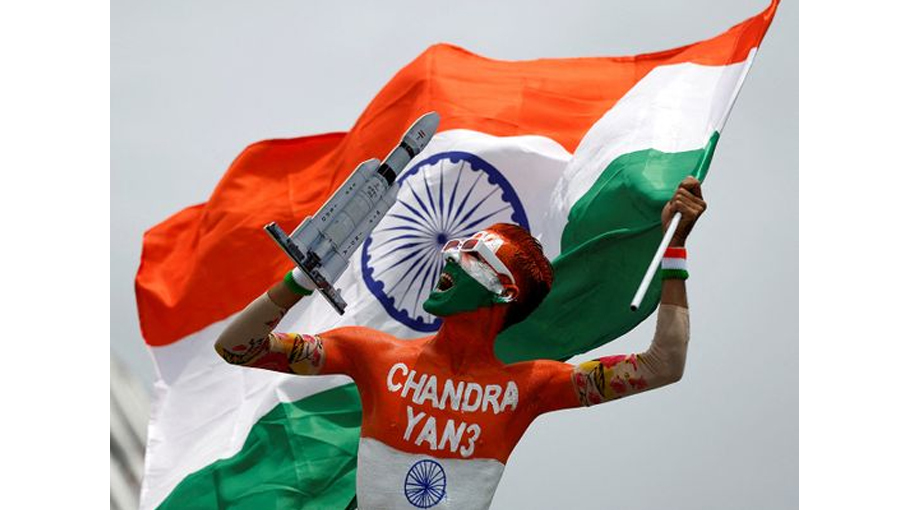Success of India’s moon mission feels personal
“India on the moon” is a personal confidence booster for every Indian


It is one of those rare moments when a national success feels personal, and may we take the liberty of saying that every Indian must feel this way at the success of India’s moon mission.
There is enough jingoism around the success of Chandrayaan-3, and someone righty tweeted that the final moments of the landing felt like the last over of a tightly-fought India-Pakistan match.
Yet this moment feels like something more than the usual muscular nationalism. It feels like a personal victory because we are a people ridden with postcolonial shame. Three centuries of European colonisation rendered us a people without self-confidence. We live with it when we have to fill out humiliatingly long forms for visas, or when we go out of our way to impress white people.
One is star-struck to think that my fellow Indians, people like me, with my taxpayer’s money, could just fire a rocket from a corner of Andhra Pradesh and it lands with elegant precision on the lunar surface, and it starts walking around to look for water. Absolutely surreal.
The long-standing desire to be a “world power”, these days defined as “Vishwa Guru” or “World’s Teacher”, is a reflection of our deeply felt need to feel equal with the first world. A cricket match or even an Olympic gold medal does not fulfil this need the way a successful moon mission does. After all, India has become only the fourth country in the world to soft-land on the moon, and the first to land near the difficult, unexplored south pole of the moon.
To be in an elite club of the United States, China, and Russia is exactly the kind of validation Indians need. This desire predates Narendra Modi and even the BJP. India is not the only country with superpower dreams — on their own ways Russia and Turkey are examples of countries trying to recover lost glory.
In 1984, Rakesh Sharma became the first and only Indian to have travelled into outer space, thanks to the then-USSR. In a radio conversation from space, when he was asked by then prime minister Indira Gandhi how India looked from space, he famously replied with Allama Iqbal’s words, “Saare Jahan Se Achcha” — better than the whole world. Iqbal may have become Pakistan’s national poet but Indians are still charged up with some of his poetry.
The success of Chandrayaan-3 will
encourage many young Indians to take to science
and space research, and India’s
private sector is about to
launch its own journey into space
Since India liberalised its economy in the early ‘90s, it has been a rising global economic force. Yet when one looks at the enormous challenges facing a country of 140 billion people, there are often moments of self-doubt. Chandrayaan-3 is just the sort of event that addresses self-doubt and assures us we are on the right track.Jawaharlal’ Nehru’s “Tryst with destiny” speech comes to mind. We “redeem our pledge” and the “soul of a nation, long suppressed, finds utterance.” It was Nehru who decided a poor country like India, which at the time was not even able to feed its hungry people, must invest in science and space research. The success of Chandrayaan-3 is a reminder that the choices that leaders make impact on nations for decades after they are gone.
The man who persuaded Nehru to invest in space research was Vikram Sarabhai, founder of the Indian Space Research Organisation. Born in an industrialist family and educated in Cambridge, Sarabhai could easily have been a corporate honcho or a scientist abroad. To stay in India and give one’s life to India, especially in those days, was an act of patriotism. It is beautiful that Chandrayaan-3’s vehicle that landed on the moon was named after him — “Vikram Lander”, out of which the Pragyaan rover emerged onto the moon’s surface. It is a metaphor for Vikram Sarabhai giving birth to Indian space research. Chandrayaan means mooncraft, Vikram means victorious and Pragyaan means wisdom, all Sanskrit/Hindi words.
“India on the moon” is a personal confidence booster for every Indian that we, too, could achieve anything, sitting right here, without the need to migrate abroad, even with lesser resources and a GDP one-fifth of China’s.
Inspiring minds, igniting hopes
It is worth asking what the success of Isro says about India, and about Indian government institutions. Two things. Firstly, when the Indian government decides to do something in mission mode, it achieves great success. The usual bureaucratic slowness gives way.
Secondly, institutional autonomy works. Just like the IIT engineering colleges and the IIM management institutes, autonomy produces results. Politicians should allocate money, and then stay away. Give Indians talent, the freedom to thrive, and they will.The success of Chandrayaan-3 will encourage many young Indians to take to science and space research, and India’s private sector is about to launch its own journey into space.
This should be seen as a unifying moment for India, in the way that no sports match, no international summit and even GDP numbers can’t be.
Shivam Vij is a journalist and political commentator based in New Delhi. He tweets as @DilliDurAst, the handle means ‘Delhi is still far’.
Source: Gulf News


